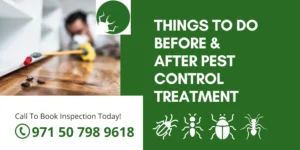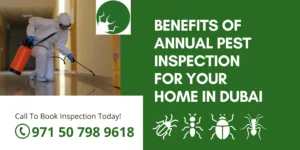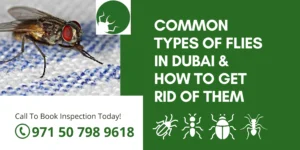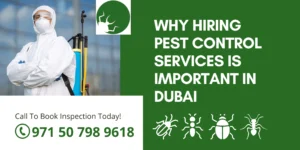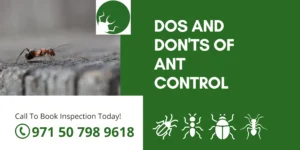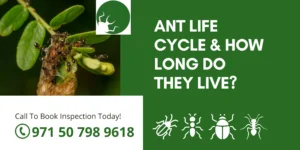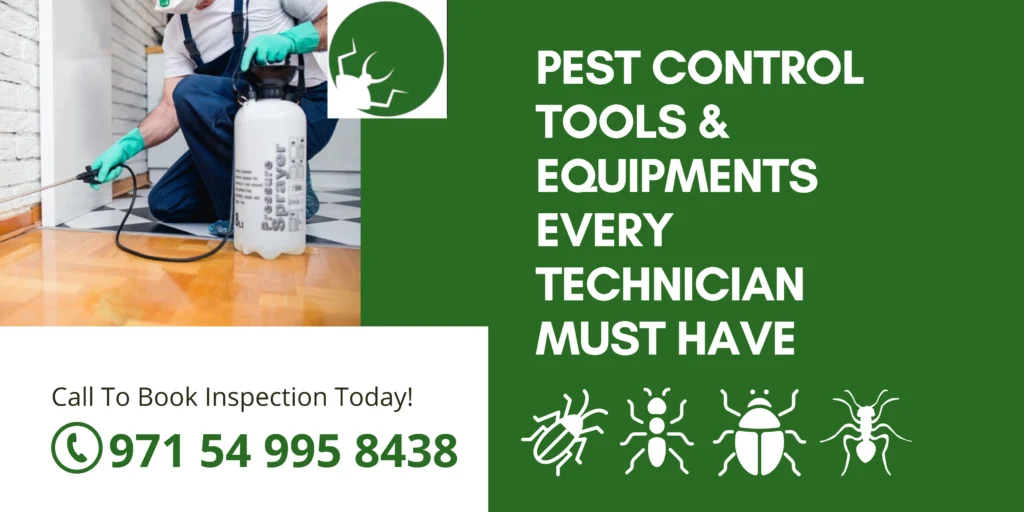
10 Pest Control Tools & Equipment Every Technician Must Have
Homes or workplaces, no spot is safe from pests that seek food and shelter with a strong will and the skill of sneakily entering and hiding in any space. However, their efforts are short-lived when you rely on a top-rated pest control company in Dubai for treatment. If this is your first time working with the pros, know the top pest control tools a seasoned team will carry so that you can ask your questions precisely and achieve peace of mind. Read on!
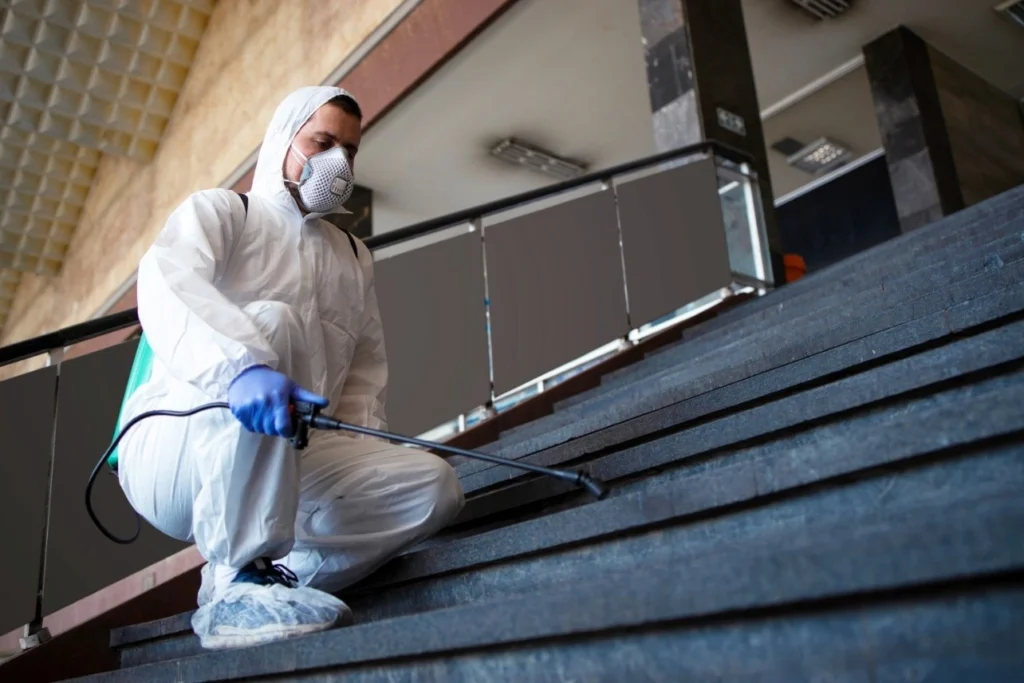
Common Skilled Pest Control Tools Pros Carry – And Why
Before starting any pest job, technicians rely on the right tools to get the job done safely and effectively. From handling insects to removing rodents, each tool plays a specific role in the process. This pest control equipment list highlights the key items professionals carry with them on the job.
1. Protective Pest Control Gear
First things first: every pest tech needs the right safety gear. Pest control chemicals can harm skin, eyes, or lungs, which is why gear such as gloves, masks, and coveralls is so important. If a pest treatment is invasive, like fogging or misting, then shoe covers and face shields can help too.
This gear protects the tech and shows clients the work is done with care. Working safely also means working smart and staying healthy on the job, especially when offering residential pest prevention tips, where local climate and home layouts may call for extra protection during certain treatments.
2. Flashlights and UV Lights
What do exterminators use to spot pests that you cannot see (or do not want to)? Flashlights are possibly the most helpful tool in pest inspection, as these creatures love the dark. They hide in basements, behind fridges, or under floorboards.
LED flashlights are best, as they shine bright and fit in one hand. Some pest technicians also use UV light to spot stains or pest trails, so as not to miss any signs.
3. Flying Insects Devices
Flying pests like flies and mosquitoes can be hard to catch and even harder to treat with sprays in some areas. That’s where pest control materials like electric fly swatters come in handy. They give techs quick control with a simple swipe, perfect for indoor areas like kitchens or offices.
For outdoor or large indoor spaces, bug zappers are a great option, as these attract insects with light and then zap them on contact. Best of all, both tools help cut down on flying pests without using chemicals.
4. Fumigation Equipment
Pest control techs need insecticide sprayers when the job is big or outside. Fumigation is usually the last resort, but it becomes key in case of widespread infestations like those of mosquitoes and termites. These sprayers hold more product and let you cover large spots fast.
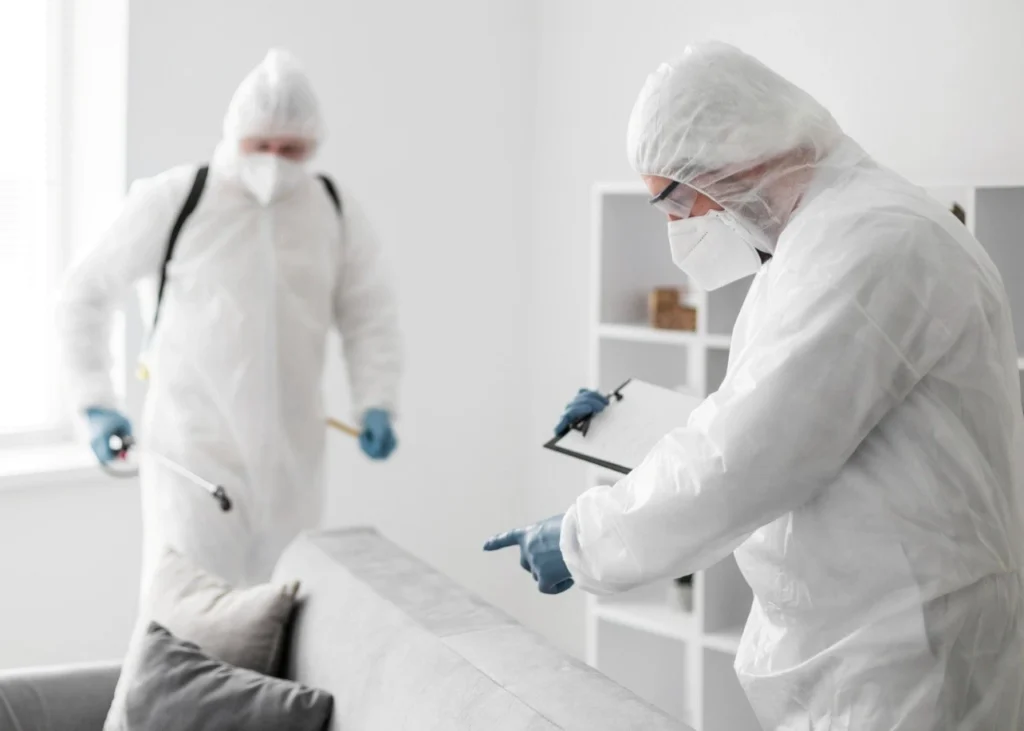
With the right sprayer and related pest control supplies, techs treat areas like yards, roofs, or storage rooms quickly and evenly, an important step especially during the hotter months when seasonal pest control tips emphasize early prevention to stop breeding cycles. This helps kill pests faster and keeps chemical use low. Some models come with long hoses or extra-large tanks, letting them treat high or hard-to-reach areas without stopping to refill.
5. Rodent Bait Stations
Rodents are probably one of the trickiest pests to deal with. That is why skilled techs use pest control equipment like rat and mouse bait stations. These have poison or traps in a safe box, so that pets or kids stay safe. The experts place them inside or outside, depending on where rats or mice show up.
The stations also help track rodent activity and let you see if the treatment is working. The best part is that you can reuse boxes once cleaned, making them cost-effective over time. Most of these stations are built to blend in, which is why they don’t scare away rodents.
6. Egg Removal Tools
What you may be unaware of is that some pests hide deep in soft surfaces plus lay eggs there. This makes them harder to treat with sprays alone. Vacuum applicators help remove bugs and their eggs directly from places like mattresses and couches. It’s the ideal tool to have for pests like bed bugs and fleas, which often stay tucked inside furniture.
So, go for a service that relies on pest control systems with vacuum machines. A reliable pest tech will use a vacuum cleaner with HEPA filters to trap fine dust and allergens, too. It’s a safe, non-chemical method that helps control infestations while protecting your stuff from stains or damage.
7. Trapping Cages
When it comes to pest control tools, there are some that are needed for larger pests. Your pest control techs should be able to catch rodents and snakes easily. Since some pests can be endangered and it is better to release them somewhere safe than kill them (which in case of snakes can be illegal), trapping cages are quite useful.
These cages work best when the techs using them are well-versed in how to catch and contain a pest. It’s a clean and kind way to solve bigger pest problems. It is also vital that the cage itself is made from tough and weatherproof materials to catch pests with less stress.
8. Detection Devices
The top pest control equipment includes everything that helps get the inspection done with precision. Pest detection devices can pick up heat, noise, or movement. These signs help techs know where to look, even if pests stay out of sight.
Some devices use sound, while others scan for moisture or track termite activity. By finding the problem faster, techs can start treatment sooner and do a better job. These tools also help show clients proof of the pest issue, which builds trust. Using detection tools also cuts down guesswork and lets you choose the best fix the first time around.
9. Disinfection Foggers
Cleanup is a vital part of the process once pests are gone, since the overall goal of any reliable pest control service is your health and safety. That is why exterminator tools should include disinfection foggers that spray a fine mist. This helps kill germs and any pests in small cracks as well.
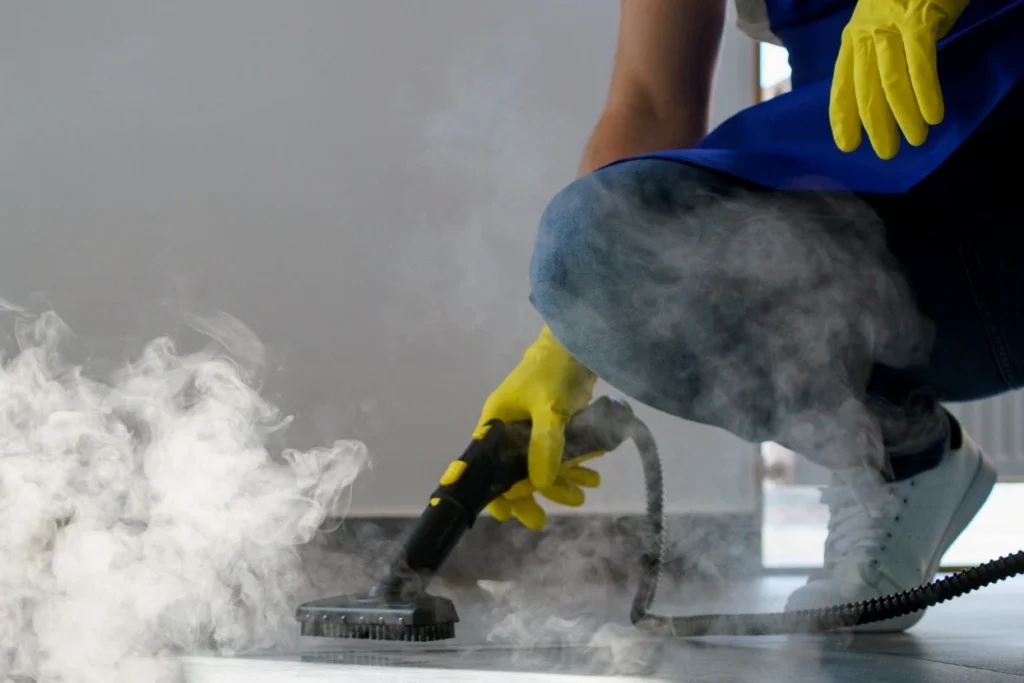
These cleaners leave the area safe. You can ask if your pest control tech carries disinfectants that are natural or eco-friendly solutions, as these are ideal for homes with pets and kids.
10. Research and Monitoring Tools
A good pest treatment service learns from every job. You know you can trust them when, besides the usual pest control tools, they also focus on research. Their tools should help them track the pests that were found, what was used to treat them (and if it worked).
The better they keep records and use them for research and improvement, the better their services become. Proper notes and using them well after every visit make the next job swifter and successful.
Bottom Line: Seasoned Pest Control Experts Matter
The ideal mix you want to watch out for when choosing a pest control technician or team is the skill and the quality of their pest control tools. Lucky for you, our skilled technicians know how to find the real cause and stop it from coming back, using top-rated tools and years of experience. Book an inspection with Pest Control Dubai today and rest easy knowing that our team works with care and follows safety steps in each visit. In a world full of pest problems, we protect homes, businesses, and your peace of mind!
Our Services
Areas We Served
Latest Post
- Things to Do Before & After Pest Control Treatment in Dubai
- Benefits of Annual Pest Inspection for Your Home in Dubai
- Common Types of Flies in Dubai & How to Get Rid of Them
- Why Hiring Pest Control Services Is Important in Dubai?
- Dos and Don’ts of Ant Control: Common Mistakes to Avoid
- Ant Life Cycle – Understanding Their Lifespan & How Long Do They Live?
Need Any Help?
Don’t wait for pests to take over, book our services today!

